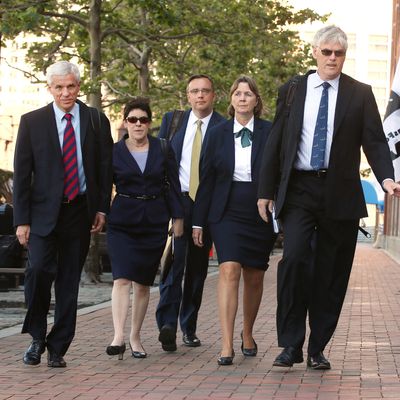
Dzhokhar Tsarnaev addressed the court and the victims of his 2013 attack at the Boston Marathon today, affirming his guilt, apologizing for his actions, and pledging his allegiance to Islam in a deeply religious statement. His remarks at today’s formal sentencing, a month after the jury opted to give him the death penalty for his role in the bombing, were the first time he’d spoken publicly. “I pray for your relief, for your healing, for your well being, for your strength,” he said, in accented English. “And I ask Allah to have mercy upon me, my brother and my family.” While his somewhat stilted remarks conveyed regret, inside the courtroom the 21-year-old continued to come across as unemotional and something short of remorseful.
He addressed the victims and witnesses who spoke during the trial. “There isn’t enough time in the day for you to relate to us everything,” he said. “I wish that four more people had a chance to get up there but I took them from you. I am sorry for the lives I’ve taken, for the sorrow I’ve caused you, for the damage I’ve caused, irreparable damage.” He also thanked his lawyers, the jury, the court, and “those who took time out of their daily lives to come and testify on my behalf, despite the pressure.”
The remarks suggested a deeply pious Tsarnaev, rather than the free-wheeling, relaxed teen his lawyers tried to paint him as. “I would like to begin in the name of Allah, the most gracious,” he opened. “I am Muslim. My religion is Islam. I pray to Allah to bestow his mercy on those affected in the bombing and their families.” Referencing the observance of Ramadan, he said, “I want to express gratitude to Allah and his creation. It is a month of reconciliation, indeed a month of many blessings … If you have not thanked the people, you have not thanked God.”
Earlier in the day, those impacted by the bombing had an opportunity to address Tsarnaev. Describing in painful detail the tremendous physical, emotional, and financial damage incurred, 24 of those injured, their relatives, and the survivors of those killed revealed a more intimate side to the tragedy as they spoke of depression, marital strain, debt, thwarted careers, guilt, and the immense burden of care-giving. As many of the speakers addressed him directly, Tsarnaev faced them with an averted gaze.
With his wife Denise, Bill Richard spoke of his family’s response to the attack that killed their young son Martin and gravely injured their daughter. “He chose hate, he chose destruction, he chose death. This is all on him,” he said, of Tsarnaev. “We choose love, we choose kindness, we choose peace. This is our response to hate. That is what makes us different from him.” Though acknowledging that his remarks did little to convey the significance of his experience, Richard spoke about the jury’s decision to apply the death penalty. “We had preferred he had a lifetime to reconcile with himself what he did that day, but he will have less than that …. Until the day he asks for reconciliation, this hangs on him. On the day he meets his maker, may he understand what he has done and may justice and peace be found.”
Patricia Campbell, mother of the late Krystle Campbell, spoke directly to Tsarnaev. “I feel that you went down the wrong road. I know life is hard but the choices you made were despicable and what you did to my daughter is disgusting. I don’t know what happened … I don’t know what to say to you but I think the jury did the right thing.” Others had statements that were more oblique, though no less cutting. “I do not know the defendant nor do I care to know him. He is a coward and a liar … he showed no remorse while the victims and their families stood in front of him,” said Jennifer Rogers, the sister of murdered police officer Sean Collier. “He is a leech, abusing the privileges of American freedom and he spit in the face of the American Dream.”
Before officially handing down the sentence, Judge O’Toole addressed Tsarnaev, telling him it was his violent crimes, not anything else, that would be his lasting legacy. “No one will remember that your teachers were fond of you. That you were funny, a good athlete. What will be remembered is that you murdered and maimed innocent people,” he said.
Citing Verdi’s opera Otello, O’Toole quoted Jago, saying “credo in un dio crudel” or “I believe in a cruel God,” suggesting anyone who could kill the innocent must, in some way, feel the same.





























